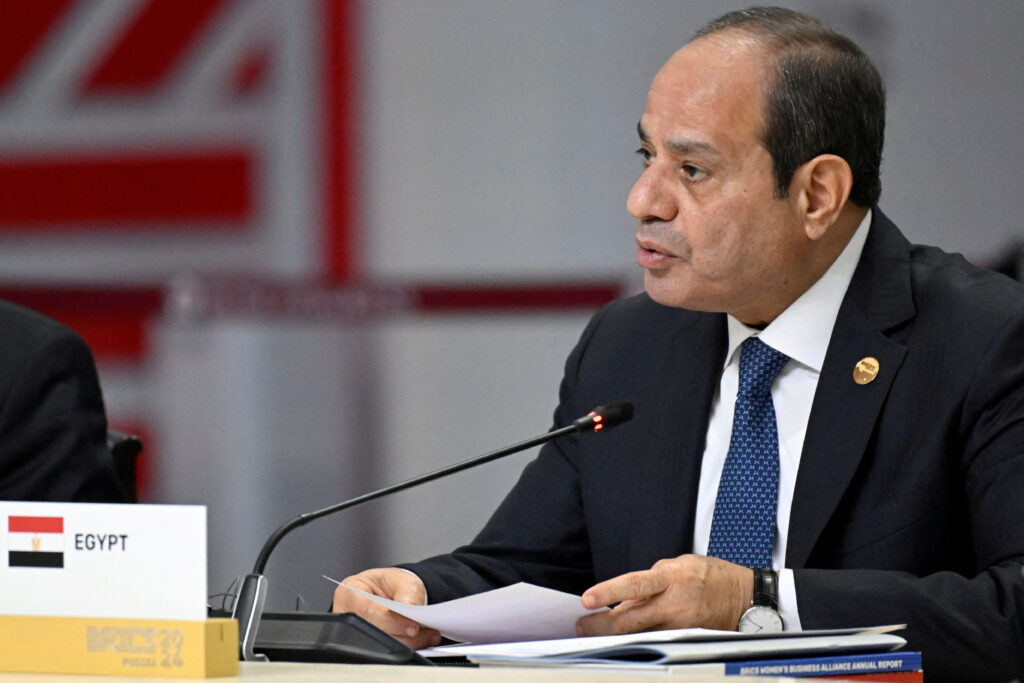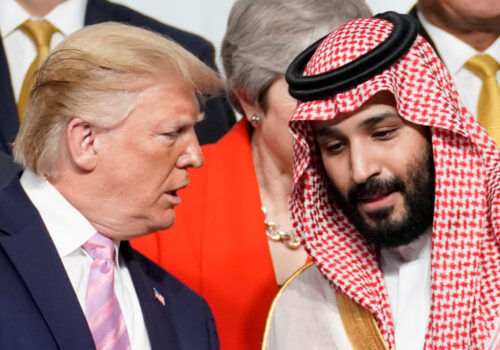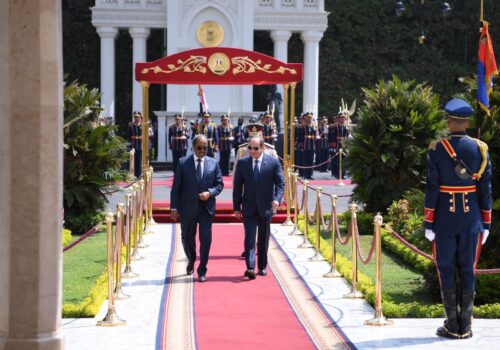Choppy waters: Egypt’s waning patience with President Trump
As Donald Trump’s landmark trip to the Middle East makes waves, Egypt is reeling after the US president demanded that Cairo allow free passage to US warships and commercial vessels through the Suez Canal.
In a social media post published on Truth Social last month, Trump wrote, “American ships, both military and commercial, should be allowed to travel free of charge through the Panama and Suez Canals.” He added that he had asked US Secretary of State Marco Rubio to immediately take care of this situation.
In exchange, Trump offered the US bombing campaign against Iran-backed Houthi rebels in Yemen. The US air strikes on Houthi targets are intended to halt attacks by the group on Red Sea shipping, which began shortly after the eruption of the Gaza war in November 2023.
Said Sadek, a political analyst specializing in Middle East affairs, told me that Trump’s comments signal “a shift in US-Egyptian relations,” which he described as being “at their lowest ebb in decades.”
He added, “They also mark a stark reversal in roles as the United States has traditionally provided Egypt with economic assistance and military aid in exchange for Israel’s security; it is now demanding payback from its longtime Middle Eastern ally.”
Over the past year and a half, Houthi attacks on commercial shipping in the Red Sea have caused a major disruption in maritime traffic, putting additional strain on Egypt’s faltering economy. Suez Canal revenues have been slashed by over 60 percent as a result of the attacks, meant as a deterrent against Israel’s war on the Gaza Strip. Waiving the fees of US vessels—which reportedly account for about 10 to 20 percent of the vital waterway’s traffic—would deal a fresh blow to the Suez Canal Authority’s already-diminished finances and hence, the state’s coffers at a time when Egypt is experiencing a foreign currency crunch.
While there has been no official response to Trump’s controversial demand for free access to the Suez Canal, the call has sparked outrage among Egyptian commentators and legislators. In a post published on his X account, Mostafa Bakry, a pro-government journalist and member of parliament, slammed Trump’s proposal as “blackmail.” He suggested that Trump’s remarks were likely in retaliation for Cairo’s rejection of the US president’s plan to relocate Palestinians into Egypt and Jordan—a move that Egypt’s Foreign Minister Badr Abdelatty has warned would seriously threaten regional stability and prompt a resurgence in radical Islamist groups.
SIGN UP FOR THIS WEEK IN THE MIDEAST NEWSLETTER
Adding insult to injury, Trump also claimed that the Suez Canal would not exist without the United States—an allegation that drew backlash from Egyptian analysts and academics who perceived it as a challenge to Cairo’s sovereignty over the canal. In a televised interview broadcast on the Egyptian satellite channel “Ten,” Aly el-din Hilal, a professor of political science at Cairo University, slammed Trump’s comments as “confrontational” and “void of historical truths.” Hilal reminded that the Suez Canal, officially inaugurated in 1869, was dug by Egyptians at a time when the United States was emerging from the Civil War.
The construction of the Canal—a key trade route between Africa and Asia—was overseen by the Compagnie de Suez, established by French diplomat Ferdinand de Lesseps for that specific purpose.
Sadek attributed Washington’s growing frustration with Cairo to the latter’s refusal to bow under US pressure to participate in the US-led aerial campaign against the Houthis. The Egyptian leadership has insisted that the maritime threat would dissipate once a ceasefire comes into effect in Gaza.
Cairo is “skeptical that the US and British bombardment of Houthi infrastructure in Yemen will achieve its desired goal of deterring Houthi attacks despite US claims that its operations in Yemen are weakening the Houthis’ military capabilities,” Sadek noted.
The latest Houthi attack targeting Israel on May 4, when a missile landed near Tel Aviv’s Ben Gurion Airport, causing its closure for several hours, has reinforced Cairo’s perception that the US-led campaign against the rebel group in Yemen has failed to destroy or weaken the latter’s capabilities. On May 26, Trump announced a pause in the military operation against the Houthis after the group reportedly told the United States that it didn’t want to fight anymore.
Relations between the United States and Egypt soured after Trump threatened to cut aid to Egypt and Jordan if the two longtime US allies rejected his displacement plan. The threats prompted President Abdel Fattah el-Sisi to call off a visit to the United States that had been scheduled for February 18.

The fact that Trump’s Middle East visit does not include a stop in Egypt also signals a widening rift between Washington and Cairo. Trump’s tour in the region will take him to Qatar, Saudi Arabia, and the United Arab Emirates. Already, the regional tour has delivered a 142 billion dollar arms deal with Riyadh, and the landmark announcement of the US lifting its Syria sanctions. Reports have also emerged that Saudi Arabia is considering offering the United States a military base on the Red Sea islands of Tiran and Sanafir, further igniting tensions in Cairo. A US base there would enable Washington to keep a watchful eye over arms smuggling from Iran to Lebanon and Gaza, but it would undermine Egypt’s sovereignty over the Suez Canal.
In a video broadcast on the BBC Arabic channel, Samir Farag, a senior strategist on Egypt’s Security and Defense Advisory Board, dismissed the rumors as “a Muslim Brotherhood conspiracy aimed at fueling tensions between Egypt and Saudi Arabia on the one hand and Egypt and the United States on the other,” insisting that there is no talk about a US base on the islands.
Farag also downplayed the dispute between Egypt and the United States, telling me that negotiations were underway between Cairo and Washington to iron out any differences.
That said, Cairo has been cozying up to US archrival China in recent weeks. The first joint military drills between the air forces of Egypt and China, conducted in Egyptian airspace from April 19 to early May, signaled the strengthening of security cooperation between the two countries. Some analysts suggest that the joint military training was intended to send a message to the United States that Cairo has other options.
“Should Trump carry out his threat of slashing military aid and economic assistance to Egypt, Cairo would turn elsewhere for support,” Sadek said, adding that it was likely a tactic aimed at securing US military aid or persuading Washington to lift its restrictions on modernizing Egypt’s air force.
While Cairo has made no secret of its strategy to diversify Egypt’s defense procurement, it appears to have grown increasingly frustrated with US limitations on upgrading its F-16 fleet.
Egypt’s State Information Service flaunted a video of Chinese J-10C fighter jets and Y-20 transport aircraft on its official Facebook page as the joint military exercises were taking place—a tell-tale sign perhaps of Egypt’s ambitions to bolster its air defense capabilities. The US Defense Department reneged on Trump’s promise to sell F-36 stealth fighters to Egypt in August 2024. Sadek argued that the US is cautious not to allow Egypt to purchase advanced fighter jets, “as this would undermine Israel’s military prowess.” If there is any truth to some media reports that an arms deal between Egypt and China that includes the sale of J-10Cs may be in the pipeline, the move would likely exacerbate tensions between the United States and Egypt and perhaps even risk the imposition of US sanctions on Egypt.
Sadek insists that Cairo does not seek confrontation with the United States and is keen on maintaining peace with Israel. While this is likely true, Washington’s latest string of provocations is testing Cairo’s patience.
Shahira Amin is a nonresident senior fellow at the Atlantic Council’s Scowcroft Middle East Security Initiative focusing on Egypt, economics, energy, water access, and women’s issues. She works in Egypt as a freelance journalist who contributes mainly to CNN’s Inside Africa and CNN’s digital platform.
Further reading
Fri, May 9, 2025
Why Trump’s Middle East trip should set sights beyond business deals
MENASource By Daniel B. Shapiro
By all accounts, US President Donald Trump’s upcoming visit to the Gulf will not prioritize major diplomatic breakthroughs.
Mon, May 5, 2025
How China turned the Red Sea into a strategic trap for the US
MENASource By
Beijing’s proxy warfare turns global trade routes into battlefields that the United States struggles to defend.
Thu, Sep 19, 2024
Egypt is cozying up to Somalia to thwart Ethiopia
MENASource By Shahira Amin
Tensions between Egypt and Ethiopia have escalated after Cairo forged closer ties with Addis Ababa's rival, Somalia.
Image: Boats move through the Suez Canal, before a press conference in "Excellence Day" as Egypt's Suez Canal Authority removes solid waste from the water in the passage in Ismalia Egypt, April 16, 2025. REUTERS/Amr Abdallah Dalsh


